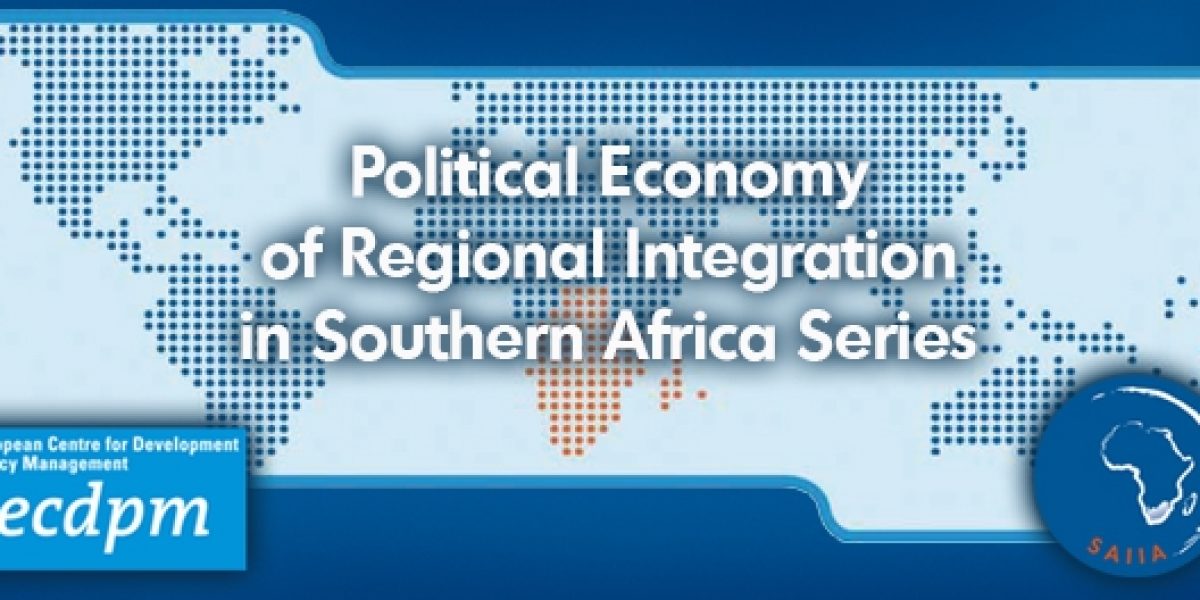The Case Studies
The cases are bundled under three headings:
- The role of private sector in public-private cooperation towards regional cooperation;
- Governance of regional public goods, with cases on energy, water, wildlife and forestry;
- The complexities of infrastructure planning being an essential element of fostering intra-regional trade and cooperation
THEME 1: Political Economy of Regional Integration in Southern Africa Series: The Regional Integration of Public Goods
by Talitha Bertelsmann-Scott
The trend in monitoring and evaluating progress in regional integration has been towards measuring success or failure on an exclusive trade integration framework. Analysts use the classic Barassa model of integration, where a regional organisation moves from a preferential trade agreement, to a free trade agreement, customs union, single market, and, ultimately, to a political union. However, this approach neglects to examine other processes that are not linked to trade integration, which could be moving ahead and integrating a region, while the trade agenda could be standing still. There is a perception in the Southern African Development Community (SADC) that progress towards achieving a full implementation of the free trade area has been very slow; and frustrations abound regarding the integration agenda. However, prior to the creation of SADC, its predecessor, the Southern African Development Coordination Conference (SADCC) – which strove to foster independence from South Africa – was considered successful in achieving integration in areas such as water, health and power.
- Download: Political Economy of Regional Integration in Southern Africa Series:The Regional Integration of Public Goods
- PERISA Case Study 1 Public Goods: Water Resource Management and Development in SADC
- PERISA Case Study 2 Public Goods: Governing Southern Africa’s Forests – The Case of REDD+
- PERISA Case Study 3 Public Goods: The Impact of Transfrontier Conservation Areas on Regional Integration
- PERISA Case Study 4 Public Goods: Building a Regional Electricity Market: SAPP Challenges
THEME 2: Political Economy of Regional Integration in Southern Africa Series: The Private Sector as a Driver of Regional Integration
by Talitha Bertelsmann-Scott
The Political Economy of Regional Integration in Southern Africa (PERISA) project generally asks the research question: ‘Who drives or drove this particular process or outcome?’. This theme, however, seeks to reverse the question to: ‘If the private sector drives a process, what is the outcome for regional integration?’. The general consensus among development and poverty alleviation thinkers is that a robust private sector is necessary for effective and continued growth in developing countries. Public actors can stimulate some private-sector growth, but for sustained growth, which delivers on more equal income distribution, the private sector needs to grow in strength and independence equal to the public sector. Support programmes for privatesector development in Southern Africa are legion and are especially supported by the EU, which is the region’s largest donor. The PERISA project recognises the role played by external actors in the promotion of privatesector development and their involvement in regional initiatives.
- Download: Political Economy of Regional Integration in Southern Africa Series: The Private Sector as a Driver of Regional Integration
- PERISA Case Study 1 Private Sector: The Non-Tariff Barrier Monitoring Mechanism
- PERISA Case Study 2 Private Sector: SADC Payment Integration System
- PERISA Case Study 3 Private Sector: The Southern African Sugar Sector
- PERISA Case Study 4 Private Sector: Regional Co-operation in the Telecommunications Sector via CRASA
THEME 3: Political Economy of Regional Integration in Southern Africa Series: The Complexities of Regional Infrastructure Planning
by Lesley Wentworth
Integrating infrastructure is a giant leap on the continuum towards deeper regional integration, allowing for better economies of scale and the development of cross-border public goods. Transport corridors (road and rail), airports and seaports link countries physically, politically and economically, and also provide global market access. Transport infrastructure is often linked to other regional infrastructure projects in energy, communications, and water and sanitation. The political-economy perspective considers how various players influence the national and regional decision-making context, and what impact their actions (or lack of action) have on the integration agenda. The infrastructure sector is certainly a catalyst for promoting long-term sustainable development of the region. The success of this relies on willing and competent institutions, political support at the highest level, a community of citizens who understand the rationale for integration, and the need for infrastructure investment and private-sector partners who come to the table with greater ambitions than simply the ‘large profit’ motive.
- Download: Political Economy of Regional Integration in Southern Africa Series: The Complexities of Regional Infrastructure Planning
- PERISA Case Study 1 Infrastructure: Donors Versus Investors in Southern African Infrastructure Development
- PERISA Case Study 2 Infrastructure: Financing of Infrastructure
- PERISA Case Study 3 Infrastructure: Analysing the Development Process for Infrastructure Projects in SADC
- PERISA Case Study 4 Infrastructure: Lesotho Highlands – Water Woes or Win–Wins
Background
In 2012, SAIIA and the European Centre for Development Policy Management (ECDPM) partnered to conduct political economic analysis on regional integration in Southern Africa. The objective of the partnership has been:
- To enhance EU-South African cooperation and understanding;
- To deconstruct the regional integration dynamics in Southern Africa;
- To provide an analysis of the role of various stakeholders and drivers in the regional integration processes; and
- To facilitate dialogue opportunities.
A scoping workshop in November 2012 brought together a small group of policy analysts, officials, private sector actors and researchers from the region in order to frame a research agenda. One of the outcomes of the scoping workshop was the petition to focus on the practical integration aspects, rather than on the formal, ambitious and ‘declared’ regional policy agenda.
This was the origins of the repository of short cases where regional cooperation in Southern Africa has worked well, or where new thinking is underway. This allows a better understanding of what and who can drive concrete regional cooperation.








